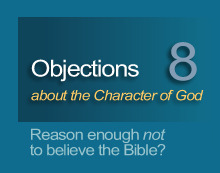WHY THIS?
There is sometimes a desire to picture God as "nice"; always helpful, always pleasant, never angry and never punishing.
Of course, our preconceptions about what God should be like do not alter the reality of who God is.
Is God truly a God who balances mercy and justice, or does he wink at evil and atrocities, holding nothing against anyone for anything?
"My conception of a divinity resists that of a God who exhibits anger or vengeance."
RESPONSE:
In other words, the horrors visited upon people by God - people he created in the first place - seem out of place if God is also said to be loving. It doesn't pass the 'smell test'.
Perhaps what would pass the smell test is an afterlife that results in disembodied minds sighing, "Ah, so THIS is what was going on. Aren't we all enlightened now, and isn't it nice it worked out for everyone. Yes, there was something to life, but no one really had more of a clue than anyone else. It's fair."
But it is not fair. You and I likely both value virtuous lives, and we see tangible good as a result of virtue for both ourselves and society. It is no illusion that we recognize murderous lives as detrimental to life and society on many levels, and affecting more than just the individuals involved. In this world there is joy and there is pain, and joy is better than pain.
You and I hear of the suicide bombers in Beslan who slaughtered hundreds of children, and of the infants they shot or bayoneted. And I expect your conception of divinity would not have an entity or power welcoming each, killers and victims, on equal footing; all having a good laugh about it right now. That would not be good, and God is not only great, he is good. If God is love, there shall be mercy. If God is good, there shall be justice. God is love, and he is good. There is no contradiction.
I don't have a winner of an analogy for this, but consider the following. It has theological holes, but is only intended for the point at the end:
-- THE ANT FARM ILLUSTRATION --Suppose, in your divine capacity, you start an ant farm. You put the ants in the glass and lay down your rules. "You're mine and I'm in charge. Stick with me and live like kings; or run loose and die." In five minutes they're all over the house. You really love them, so you don't enforce your promised consequences yet, but for now you demand they return to the glass where you still want to make kings out of them. You commission your listeners to spread the word of this great second-chance to the others.
Ant families grow and your word get passed along. Some ants return, others don't. To the ones that return, you promise to guard and keep forever. Of the ones who don't return, a few had a penchant for escape anyway and would never have been happy within your confines. Others don't get the word, or don't believe the words were yours. Judging by appearances, the non-returning ants seem about as provided for as the ones back in your care. But, of course, that is because they've managed to find their own provision - eating your studs in your walls.
Now if the room collapses as a result of damage, not only will the ants in the wall be crushed, but so will the ones in the glass. Yet you've promised protection to the ones that returned to the glass, and promised death to those that left. If you submit the fate of your house to the roaming ants, then you're not in charge like you stated. And if you let roaming ants corrupt your structure, that isn't protecting the ants in the glass like you promised. Even if you could protect the structure, you did make a promise to kill the ants outside the glass. Having to kill the ants in the wall makes you angry and breaks your heart, but doing so...
1) saves the lives of the ants who humbly returned,
2) keeps your promise of a second chance to those ants,
3) exercises your stated authority over your house, and...
4) keeps your promise of destruction to all ants remaining outside the glass.
Here's the point: how inconceivable is it to expect yourself to keep your own promises? It is completely conceivable. Just maybe your conception of a divinity can accommodate a God who, balancing mercy and justice, keeps his own promises, too.
See also:
What is the Gospel?
What is truth?



Expanded!